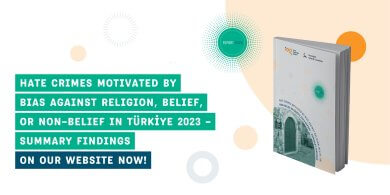OSCE: Lack of hate crime recording means victims too often remain invisible
The Organization for Security and Co-operation in Europe (OSCE) Office for Democratic Institutions and Human Rights (ODIHR) has published the "2019 Hate Crime Report".


“2019 Hate Crime Report” contains quantitative and qualitative information on hate crime incidents in the countries across the OSCE region. In addition to the official data provided by the OSCE’s 39 participating states, the report includes information on hate incidents in 45 participating countries, reported by 148 non-governmental organizations. According to the “2019 Hate Crime Report”, which is the most comprehensive report on hate crimes worldwide, 6,964 bias-based hate crimes were recorded in the OSCE region in 2019.
According to OSCE hate crimes “are criminal acts motivated by bias towards particular groups of people. Bias motivations can be broadly defined as preconceived negative opinions, stereotypical assumptions, intolerance or hatred directed to a particular group that shares a common characteristic, such as race, ethnicity, language, religion, nationality, sexual orientation, gender, disability or any other fundamental characteristic. Hate crimes can include threats, property damage, assault, murder or any other criminal offence committed with a bias motivation”.
In this sense, in the report these crimes are categorized as racism and xenophobia, anti-semitism, bias against people with disabilities, Roma and Sinti, Muslims, Christians, gender, sexual orientation or gender identity or members of other religions or beliefs. Accordingly, the number of recorded hate incidents in the OSCE region by bias motivation are as follows:
- racism and xenophobia: 3,033
- anti-semitism: 1,704
- bias based on sexual orientation or gender identity: 1,278
- bias against Christians: 577
- bias against Muslims: 511
- bias against Roma and Sinti: 101
- bias based on gender: 70
- bias against people with disabilities: 21
The report indicates that 79 hate crimes was recorded by the police in Turkey and 72 of these crimes are attacks against places of worship and 7 of them are threats or threatening behaviours. However, ODIHR observes that Turkey’s law enforcement agencies have not recorded the bias motivations of these crimes. 84 hate crime incidents, that were reported by the Freedom of Belief Initiative, Human Rights Association, KAOS GL, Cantor Center, London Legal Group, Transgender Europe, and Holy See, are also included. Accordingly, the number of hate incidents by bias motivation in Turkey are as follows:
- bias based on sexual orientation or gender identity: 57
- racism and xenophobia: 13
- bias against Muslims [1]: 9
- bias against Christians: 5
- anti-semitism: 3
- bias based on gender: 1
According to ODIHR, Turkey continued implementing ODIHR’s Training against Hate Crime for Law Enforcement (TAHCLE) programme, following a memorandum of understanding signed in 2016. Several thousand police officers have been trained on hate crimes since then. In 2019, the Turkish National Police co-operated with the Police Academy to deliver the training programme to 603 police officers.
In addition to this, in the framework of the Judicial Reform Strategy, launched on 30 May 2019, a working group examined international reports and recommendations by UN Human Rights Mechanisms and the OSCE, as well as good practices from other countries. The working group prepared a document aimed at harmonizing provisions on hate crime with international standards and creating a database of hate crime statistics. Several state authorities and civil society organizations were involved in the process. During a meeting held in December 2019, the working group underscored the need to strengthen efforts to raise awareness of hate crimes. It was also emphasized that a holistic approach should be made to combat hate crimes, and that the upcoming Human Rights Action Plan should include new reforms and regulations regarding hate crimes.
The data published in the report show that in many countries there are mechanisms to record and collect comprehensive data on hate crimes. However, a large number of states do not provide police and prosecutors with the tools and knowledge they need to recognize, record and effectively investigate such crimes. This frequently deprives hate crime victims of the opportunity to access needed specialist support.
Since victims of hate crime are targeted for who they are and for characteristics intrinsic to their identity, and which they share with others, ODIHR emphasizes that recording such crimes and offering support to those affected is key to ensuring the security of individual victims, their communities and society as a whole. Additionally, they put a special emphasize on providing tailored support for individual needs of hate crime victims. By prioritizing sensitive treatment to prevent further psychological harm for victims and support the long-term recovery of them, ODIHR also underlines the importance of police protection, psychosocial support, practical assistance, and information about criminal proceedings. In this regard, ODIHR offers countries across the OSCE region a range of tools to help them support hate crime victims, improve hate crime monitoring and recording practices, and strengthen co-operation with civil society.
[1] All of these incidents are attacks against members of the Alevi community living in Turkey, in the original data set they were recorded as “bias against Muslims”.



